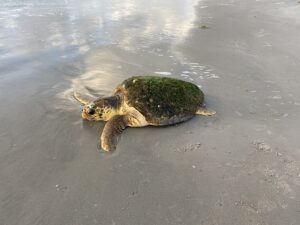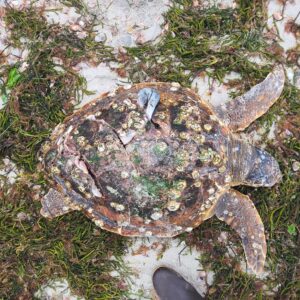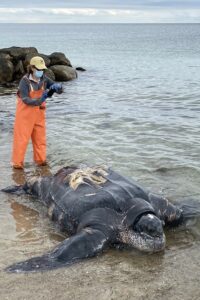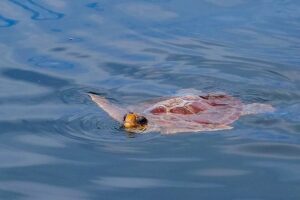The leatherback turtles are here for their annual visit, feeding in Cape Cod Bay. The loggerheads are here too — though they’re more recent arrivals as climate change has made the water more hospitable to them.

Both species of sea turtles are listed as federally endangered, and both are at risk of crossing paths with boats and fishing gear that can leave them injured or dead in our busy summer waters. The peak time for these encounters is still ahead — now through September — but this year already looks to be an especially bad one for the turtles.
When a sea turtle washes ashore or is found dead in the water, Mass Audubon is charged with responding. Most years, by the middle of July, their teams will have responded to two to four stranded turtles on the Cape and Islands, said Karen Dourdeville, the organization’s sea turtle stranding coordinator.
This year, her team has so far found 11 dead turtles, all of them loggerheads. Six of them had wounds consistent with boat strikes, while the other five were found dead but without the gashes in their shells that characterize those strikes. Sea turtle researchers think they may have drowned after being entangled in fishing gear.
The Center for Coastal Studies in Provincetown has responded to three different entangled leatherback sea turtles, all in the latter half of July, according to Scott Landry, director of the Marine Animal Entanglement Response Program at the center. All three survived and were released. Landry’s team attached a tracker to one of them, which they named Phinney, to monitor its survival. As of July 26, it was doing well.
Sea turtles take a long time to reach maturity — upwards of 30 years for loggerheads — so every adult turtle that is saved is one more viable reproductive member in the population, said Dourdeville.
Look Out for Loggerheads
Loggerhead sea turtles are particularly susceptible to boat strikes, Dourdeville said, because they tend to swim just below the surface where they can be hard to distinguish from a patch of seaweed.

Dourdeville said that boaters should keep an eye on the water ahead of their boats for animals on the surface. “You’re going to have a more interesting trip, and you might save a sea turtle,” she said.
The six loggerhead turtles that suffered boat strikes so far this year were found south of the Cape: two off Chatham, one each off Falmouth, Yarmouth, and Barnstable, and another far offshore.
It’s hard to know whether the increase in boat strikes is because more of the turtles are here or because of a larger number of boaters, or whether it’s a case of “wrong place, wrong time,” Dourdeville said. “We just don’t know.”
Entangled Turtles
Most of the turtles that end up entangled around Cape Cod are the all-dark leatherbacks — the largest sea turtles in the world. These reptiles regularly get caught in fishing gear, particularly pot fishing gear used to fish for lobster and conch. It’s hard to find a pattern in the entanglements: some years, Landry and his team see as few as five entanglements over the summer; other years they may see up to 60.
As for the loggerheads that appear to have been entangled, Landry said he suspects that may be happening more regularly than his team has realized.
Loggerheads eat a variety of foods, including dead fish, which makes bait on a fishing line a tempting meal. If one of these turtles were to eat bait from a detached line, it could get caught on the hook, then become further entangled, Landry said, until it is eventually no longer able to surface and drowns.
“If a loggerhead becomes entangled on the sea floor, its body won’t be visible for anyone to see,” he said. But as their bodies decay, they might detach from the hooks, eventually washing ashore with no visible wounds.
Without disentanglement efforts, Landry said, it would be unlikely that any of these turtles would survive. “They don’t have claws, they don’t have teeth, they can’t help themselves out of the entanglement,” he said.
If you encounter a sea turtle, alive or dead, Dourdeville says to report it to the Sea Turtle Sighting Hotline for Southern New England Boaters, which is part of the sea turtle program at Mass Audubon’s Wellfleet Bay Wildlife Sanctuary, by going online to seaturtlesightings.org or by calling 1-888-SEA-TURT (888-732-8878). The hotline collates sea turtle sightings to better inform boaters about their presence.
If the turtle is entangled, Doudeville said, call the Center for Coastal Studies entanglement hotline at 1-800-900-3622.


